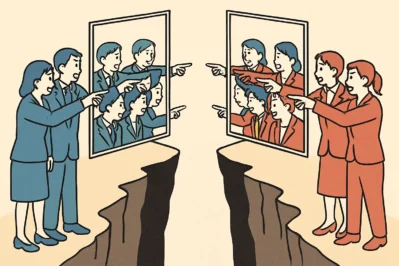Navigate the Divide: Master Advanced Korean Political Discourse
Hello everyone! Welcome to Maeil Hangul, where we upgrade your Korean skills one post at a time!
Are you ready to move beyond everyday conversation and dive into the complex, fascinating world of Korean societal discussions? Today, we’re tackling a hot topic: Political Polarization. This is for advanced learners who want to understand Korean news, participate in nuanced debates, and truly grasp the undercurrents of modern Korean society.
Lately in Korea, online political discourse on platforms like YouTube and community forums has become incredibly passionate and, at times, divisive. Understanding the specific vocabulary used in these debates is key to not just following along, but forming your own sophisticated arguments. Let’s get started!
Key Expressions for Political Debate
Here are the essential terms you need to know to sound like a seasoned political analyst.
1. 양극화 (兩極化)
- Pronunciation [Romanization]: Yang-geuk-hwa
- English Meaning: Polarization
- Detailed Description: This is the foundational concept. It comes from the Hanja characters for “two” (兩) and “extreme poles” (極). It refers to the widening gap between opposing groups, especially political ones (like progressive vs. conservative). When you hear news about political conflict in Korea, this word is almost always present. It describes a situation where compromise is difficult because both sides are at extreme ends of the spectrum.
2. 진영 논리 (陣營 論理)
- Pronunciation [Romanization]: Jin-yeong nol-li
- English Meaning: Camp logic; factional logic; political tribalism
- Detailed Description: This is a crucial term for understanding Korean politics. 진영 (Jin-yeong) means “camp” or “faction,” and 논리 (nol-li) means “logic.” Together, it describes a way of thinking where one’s primary loyalty is to their political “camp” rather than to objective facts, principles, or the greater good. It implies that a person will support anything their side does and oppose anything the other side does, regardless of the issue’s merits. It’s the essence of “us vs. them” thinking.
3. 내로남불
- Pronunciation [Romanization]: Nae-ro-nam-bul
- English Meaning: Hypocrisy; “What I do is romance, what others do is an affair.”
- Detailed Description: This is a massively popular four-character acronym that has entered the standard lexicon. It’s short for “내가 하면 로맨스, 남이 하면 불륜” (Nae-ga ha-myeon ro-maen-seu, nam-i ha-myeon bul-lyun). It perfectly captures the idea of a double standard. In political contexts, it’s used to criticize politicians or parties who condemn their opponents for actions they have committed themselves. It’s a powerful and frequently used accusation.
4. 확증 편향 (確證 偏向)
- Pronunciation [Romanization]: Hwak-jeung pyeon-hyang
- English Meaning: Confirmation bias
- Detailed Description: A more academic, but very common term in media analysis. It refers to the tendency to search for, interpret, favor, and recall information that confirms or supports one’s preexisting beliefs or values. It’s often cited as a key reason why political 양극화 worsens, as people consume media only from sources that align with their 진영 논리, reinforcing their own views and deepening their distrust of the other side.
Example Dialogue
Let’s see how these terms play out in a conversation between two friends discussing the news.
A: 요즘 정치 유튜브만 보면 머리가 아파. 완전 진영 논리에 빠져서 합리적인 토론이 불가능한 수준이야.
(A: I get a headache just watching political YouTube channels these days. They’re so deep into camp logic that rational discussion is impossible.)
B: 맞아. 사회적 양극화가 그만큼 심각하다는 증거겠지. 사람들은 확증 편향 때문에 자기가 믿고 싶은 것만 보려고 하잖아.
(B: Right. I guess it’s proof of how severe our societal polarization is. Because of confirmation bias, people only try to see what they want to believe.)
A: 특히 정치인들의 내로남불 행태는 정말 실망스러워. 그런 태도가 국민들을 더 분열시키는 것 같아.
(A: The hypocrisy of politicians is especially disappointing. That kind of attitude seems to divide the public even more.)
B: 동의해. 이 문제를 해결하려면 시간이 아주 오래 걸릴 것 같아.
(B: I agree. It feels like solving this problem is going to take a very long time.)
Culture Tip & Trend Analysis
From Newsdesks to Online Forums:
These terms aren’t just for academics or news anchors anymore. Words like 진영 논리 and 내로남불 are now standard vocabulary in online communities like ‘dcinside’ (디시인사이드), ‘fmkorea’ (에펨코리아), and in the fiery comment sections of Naver News articles.
The term 내로남불 in particular exploded in popularity over the last few years. While it existed before, it was heavily used by politicians and the media to criticize each other, which ironically made the public adopt it as the perfect word to describe the politicians themselves! Using this word correctly shows you have a deep, contemporary understanding of Korean political culture. It signals that you don’t just know the language, but you get the social context.
Let’s Practice!
Ready to test your knowledge? This will help you solidify these powerful concepts.
- Fill in the Blank: A political party strongly criticizes its opponent for appointing an unqualified person to a high position. A month later, the same party appoints one of its own unqualified loyalists to a similar role. This is a perfect example of _______________.
-
Short Answer: In your own words (in English or Korean!), how does 진영 논리 (camp logic) contribute to 확증 편향 (confirmation bias) in modern media consumption?
Great job today! Mastering these expressions will allow you to engage in some of the most important conversations happening in Korea right now.
Leave a comment below using one of the expressions we learned today! We’d love to see you put your skills to the test.






